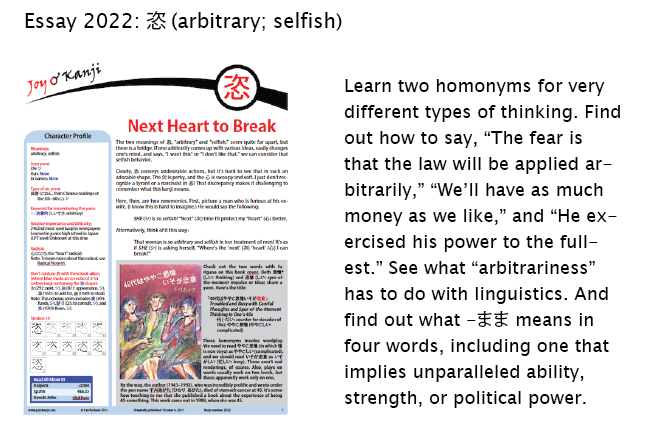Energy Moving in Two Directions
Long time no see! I haven't been nearly as bloggy lately, and I apologize for my silences here, though it's not that I've been idle. Rather, writing three Radical Notes and the last newsletter took up much of my time, as have other responsibilities. In fact, I believe this term is applicable:
精を入れる (せいをいれる: to work hard) energy + to put in
Strangely, whether you put in energy or whether it comes out, you end up with the same thing:
精を出す (せいをだす: to work hard) energy + to come out
I came upon the first expression in essay 1922 on 零 (zero; to spill; small), which posted last week. I've been so busy that I haven't had a chance to tell you about fun terms from that essay or even one word from essay 1779 on 弊 (harmful influence; worn out; humble prefix), which I released a month ago.
The great news is that it takes longer than a month for words to go out of style, so they're fresh enough to use here!
Let's start with a quiz. Match the following terms with one definition apiece:
1. 茶番 (ちゃばん)
2. 便利屋 (べんりや)
a. conveniently located inn
b. tea utensils and apparatus
c. tea shop
d. farce; charade
e. handyman
I'll block the answers with a preview of the newest essay:
Okay, here we go.
1.d. 茶番 (ちゃばん: tea + person in charge of something) means "farce; charade." Actually, those are only the primary meanings. Here are all the definitions of this term:
(1) farce; charade
(2) person who serves tea
(3) short and humorous improvised sketch (originating from Edo-era kabuki)
Definition #2 was the original one. Then came #3, and finally #1. Now people are most familiar with #1.
2.e. 便利屋 (べんりや: convenient (1st 2 kanji) + person with a business) means "handyman." A handyman provides convenience!
Speaking of businesses, the following title is part of essay 1922, where I introduce 零細企業 (れいさいきぎょう: small business; microenterprise):
「零細企業のホームページが繁盛店に化けた理由」
How a Small Business’s Website Turned Into a Successful Online Store
繁盛店 (はんじょうてん: prosperous business); 化ける (ばける: to improve unexpectedly and dramatically); 理由 (りゆう: reason)
The word 化ける jumped out at me because of its wonderful definition. There’s a word for that? What an optimistic word!
Finally, we have this puzzler:
千年来 (せんねんらい: for a thousand years)
1,000 + years + for the past (amount of time)
I associate 来 with the future, as in 将来 (しょうらい: future (usu. near)) and 未来 (みらい: future (usu. distant)), but 千年来 is about something that began a millennium ago!
As in 以来 (いらい: since), the 来 in 千年来 means that something has been true since a certain point in time. The period that started in the past and has lasted till now is associated with the idea of “coming” (来).
Incidentally, my proofreader says that 将来 means “about to (将) come (来)" and that 未来 breaks down as “hasn’t yet (未) come (来)."
The word 千年来 appears in this sentence from essay 1779 and showcases 余弊 (よへい: lingering ill; holdover):
相手の身分によってへつらうのは千年来の余弊だ。
Flattering someone because of his status is a holdover from a thousand years ago.
相手 (あいて: other person); 身分 (みぶん: status); によって (depending on); へつらう (諂う: to use flattery, a non-Joyo kanji)
Brown-nosing is a relic? I have found that flattery never goes out of style. This aspect of human nature seems more enduring than some vocabulary words!
Have a wonderful week!
❖❖❖
Did you like this post? Express your love by supporting Joy o' Kanji on Patreon:



Comments